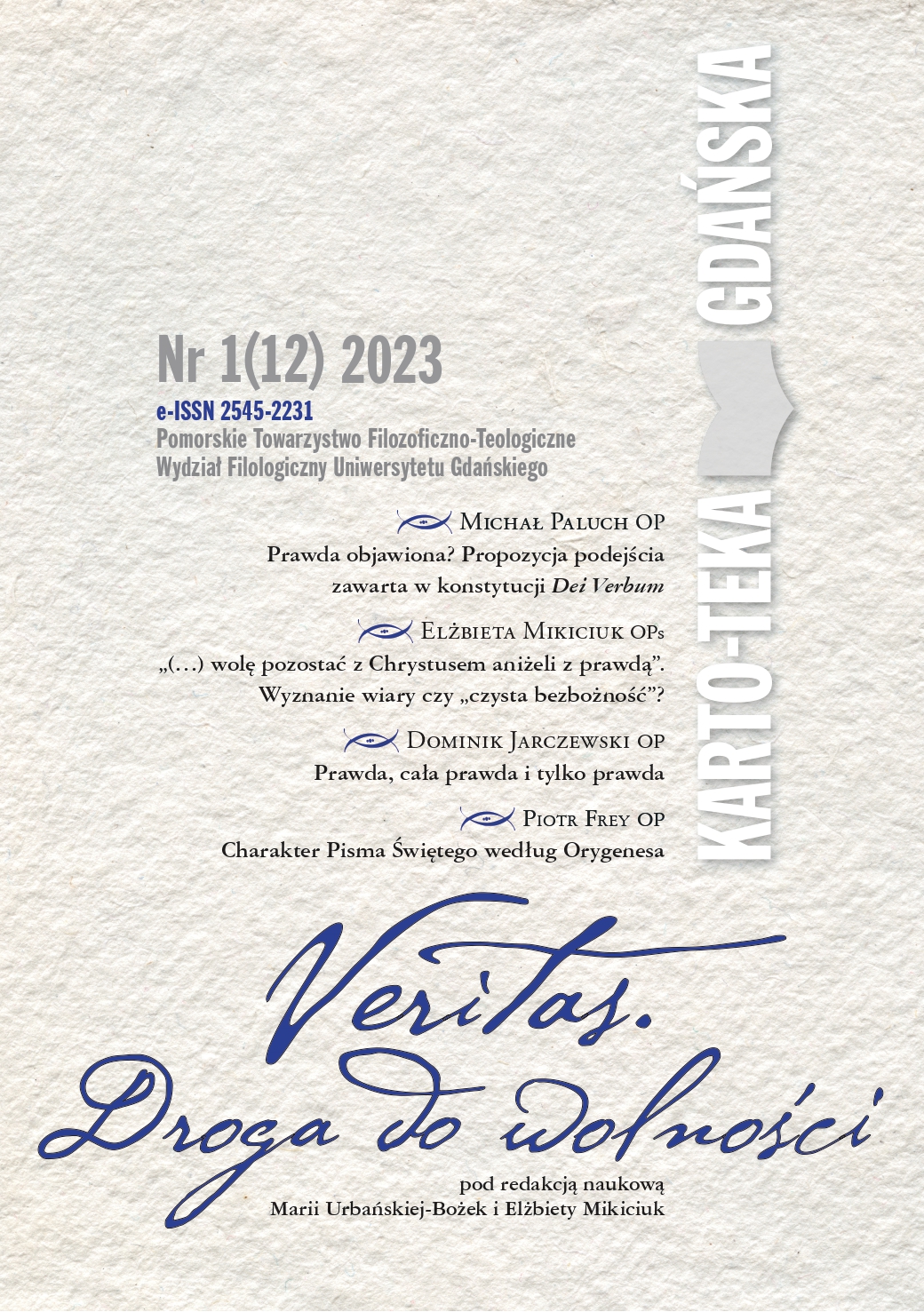Prawda, cała prawda i tylko prawda. Czego szukamy, szukając poznania?
DOI:
https://doi.org/10.26881/kg.2023.1.03Słowa kluczowe:
wartość wiedzy, prawda, dobra epistemiczne, Problem Menona, nonfaktywizm, epistemologia społecznaAbstrakt
Przedmiotem artykułu jest argumentacja za tezą, że prawda jest ostatecznym celem poznawczym. Po pierwsze, badam dwie intuicje, które – jak dowodzę – są kluczowe w argumentacji o niewystarczalności prawdy jako celu poznania. Następnie odpowiadam na nie, z jednej strony pokazując, że nie można zredukować problemu wartości wiedzy do jej natury, a z drugiej strony twierdząc, że można pogodzić wystarczalność prawdy jako celu poznania z wartością uzasadnienia w poznaniu, korzystając z rozróżnienia na dobra godne podziwu i pożądania. Wskazuję ponadto, że perspektywa epistemologii społecznej pozwala wzmocnić rolę uzasadnienia przy zachowaniu silnej tezy o samowystarczalnej wartości prawdy dla wiedzy. W końcu prezentuję odpowiedzi na nowsze kontrargumenty Kelpa i Elgin, dotyczące odpowiednio kresu badania oraz wartości fałszów w poznaniu.
Downloads
Bibliografia
Alston W., Concepts of Epistemic Justification, „Monist” 1985, t. 68, nr 1, s. 57–89.
———, Beyond „Justification” : Dimensions of Epistemic Evaluation, Cornell University Press, Ithaca 2005.
Ballantyne N., Knowing our Limits, Oxford University Press, New York 2019.
Boylu A., How Understanding Makes Knowledge Valuable, „Canadian Journal of Philosophy” 2010, t. 40, nr 4, s. 591–609.
Craig E., Knowledge and the State of Nature : An Essay in Conceptual Synthesis, Oxford University Press, Oxford 1990.
Elgin C., True Enough, „Philosophical Issues” 2004, t. 14, nr 1, s. 113–131.
Gettier E., Is Justified True Belief Knowledge ? „Analysis” 1963, t. 23, nr 6, s. 121–123.
Goldman A., The Unity of the Epistemic Virtues, w : Virtue Epistemology : Essays on Epistemic Virtue and Responsibility, red. A. Fairweather i L. Zagzebski, Oxford University Press, New York 2001, s. 30–48.
Grimm S., Is Understanding A Species Of Knowledge ? „The British Journal for the Philosophy of Science” 2006, t. 57, nr 3, s. 515–535.
———, Understanding and Transparency, w : Explaining Understanding: New Perspectives From Epistemology and Philosophy of Science, red. S. Grimm, C. Baumberger i S. Ammon, Routledge, New York 2016, s. 212–229.
Hannon M., What’s the Point of Knowledge ? A Function-First Epistemology, Oxford University Press, Oxford 2019.
———, Recent Work in the Epistemology of Understanding, „American Philosophical Quarterly” 2021, t. 58, nr 3, s. 269–290.
James W., Prawo do wiary, tłum. A. Grobler, Wydawnictwo Znak, Kraków 1996.
Kelp C., Towards a Knowledge-Based Account of Understanding, w : Explaining Understanding: New Perspectives from Epistemology and Philosophy of Science, red. S. Grimm, C. Baumberger i S. Ammon, Routledge, New York 2017, s. 251–271.
———, Inquiry, Knowledge, and Understanding, Oxford University Press, Oxford 2021.
———, Theory of Inquiry, „Philosophy and Phenomenological Research” 2021, t. 103, nr 2, s. 359–384.
Kvanvig J., The Value of Knowledge and the Pursuit of Understanding, Cambridge University Press, Cambridge 2003.
Kyriacou C., Ought to Believe, Evidential Understanding and the Pursuit of Wisdom, w : Epistemic Reasons, Norms and Goals, red. M. Grajner i P. Schmechtig, De Gruyter, Berlin 2016, s. 383–406.
Lewis C.I., On Two Types of Judgment (notatka z 1.03.1937), s. 4, Archiwa C.I. Lewisa, Pudło 14, Teczka 17, Uniwersytet Stanforda.
Platon, Gorgiasz; Menon, tłum. W. Witwicki, Antyk, Kęty 2002.
Pritchard D., Epistemic Luck, Clarendon Press, Oxford 2007.
———, Epistemic Axiology, w : Epistemic Reasons, Norms and Goals, red. M. Grajner i P. Schmechtig, De Gruyter, Berlin 2016, s. 407–422.
Singer D., How to Be an Epistemic Consequentialist, „The Philosophical Quarterly” 2018, t. 68, nr 272, s. 580–602.
Williams B., Problems of the Self : Philosophical Papers, 1956-1972, Cambridge University Press, Cambridge 1973.
Williamson T., Knowledge and its Limits, Oxford University Press, Oxford 2000.
Zagzebski L., The Inescapability of Gettier Problems, „The Philosophical Quarterly” 1994, t. 44, nr 174, s. 65–73.
———, Virtues of the Mind : An Inquiry into the Nature of Virtue and the Ethical Foundations of Knowledge, Cambridge University Press, New York 1996.
———, The Search for the Source of Epistemic Good, „Metaphilosophy” 2003, t. 34, nr 1/2, s. 12–28.
———, Recovering Understanding, w : Virtue Epistemology. Contemporary Readings, red. J. Greco i J. Turri, MIT Press, Cambridge 2012, s. 351–373.
———, From Reliabilism to Virtue Epistemology, w : Epistemic Values, Oxford University Press, Oxford 2020, s. 141–151.

 Uniwersyteckie Czasopisma Naukowe
Uniwersyteckie Czasopisma Naukowe

